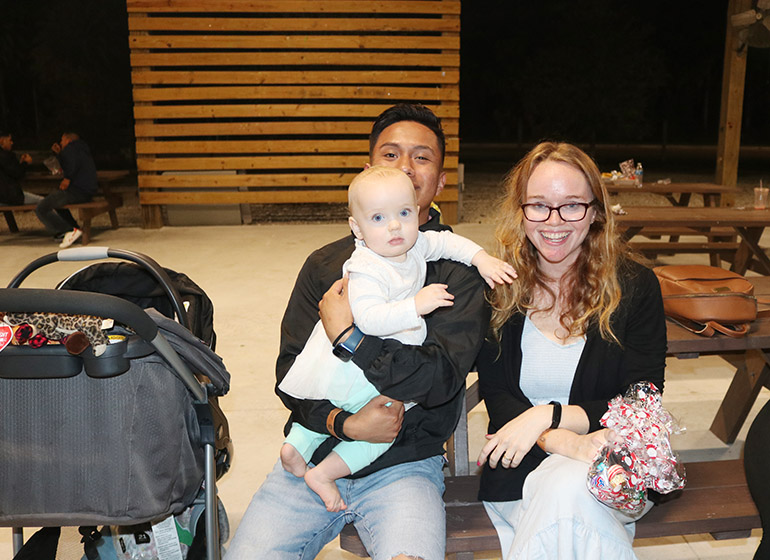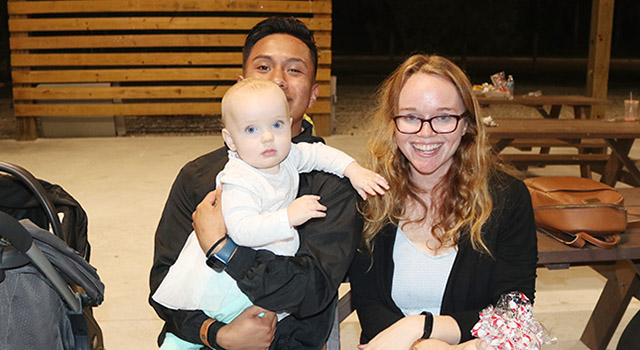By Rocio Granados - La Voz Catolica

Photographer: ROCIO GRANADOS | LVC
Caroline Hazelton, a foster mother, poses for a photo with 19-year-old Brandon Garcia, who is holding his foster baby sister. The Hazeltons took Brandon into their home for a few months as part of Catholic Charities of Miami's Unaccompanied Refugee Minors Program.
MIAMI | Caroline Hazelton is a foster parent of unaccompanied refugee children. She has always been concerned about immigration in the country and the world. Originally from Jacksonville, Florida, she teaches English as a Second Language to immigrants arriving in South Florida.
"What really got our attention was the family separation in 2018," said Hazelton. This prompted her and her husband to look for ways to get involved and help. They also enjoyed enough economic stability to be foster parents.
Being foster parents to children who are on their own in this country, and who come from different parts of the world, fit well "with our beliefs of loving your neighbor as yourself, loving people around the world who don't look like you, who don’t believe like you, who aren’t from the same country, don’t speak the same language as you. And just wanting to grow our family," Hazelton said.
The Hazeltons have three biological daughters and are currently welcoming two Afghan teenagers into their home. Over the past four years, they have fostered 12 children through the Unaccompanied Refugee Minors Program of Catholic Charities of the Archdiocese of Miami.
Being a foster parent involves challenges, among them people's prejudices. “The media portrays people like refugees in particular as people who are going ruin your home, who are bad people," said Hazelton.
She added that she has heard some well-intentioned concerns about what could happen when you have young girls and let teenage boys into your home. "But there’s been nothing but love and family in every way," Hazelton said, adding that the young people who have been welcomed into her home are like big siblings to her daughters.
"If you're going to open your home to a child, open it with all your heart,” said Dilcia Zubizarreta, another foster mother to unaccompanied refugee minors since 2005, when the program began in Miami. “Don't start thinking that they are going to steal from you, because they are not going to do that; or that they will do this or that to you. They are very respectful. When you bring them to your home, show them everything. Tell them, 'Here’s the fridge, here’s this, here’s that, and you can eat whenever you want, drink juice or whatever'".
The Unaccompanied Refugee Minors Program welcomes children between the ages of 14 and 17. According to CEO Peter Routsis-Arroyo, Miami’s program “is the only one in the state of Florida. And you don't have to be Catholic to be a foster family.”
Most of the minors currently in the program entered the U.S. through the Mexican border without their parents. They have been granted refugee immigrant status because they have no family members or guardians to care for them in this country.
"The immigration status of these minors is mostly settled,” said Jackie Carrion, director of Community Services for Catholic Charities of the Archdiocese. “They may be refugees, they may have special immigrant juvenile status, they may be victims of human trafficking, or Cuban and Haitian arrivals."
But, she added, “we also have cases where the minors are in other countries such as Congo, Nepal, Myanmar, where their refugee status is determined there and then they can enter the program."
Catholic Charities trains and offers continuous support to those who volunteer as foster parents so that they can provide the children with a family atmosphere in which to live while helping them integrate into life in the United States.
Due to the large number of unaccompanied minors currently crossing the border, more families are needed to be their parents and mentors, "to help them transition into American culture and also experience family life,” said Danielle Anderson, URMP Program Coordinator for Catholic Charities. “Most of the children arriving are unaccompanied minors. That means they were abandoned by their parents, or their parents died, or something happened and they can no longer be with their parents. It would be good for them to have a family environment."
Foster parents must fulfill some requirements and receiving training before welcoming a minor into their home.
"The program is always focused on protecting the children and we are always working with the parents, not only during the trainings, but in any area where they think they need to learn more or need more help," said Carrion.
The training is provided by Florida’s Department of Children and Families, and is available both in person and online.
"They teach about the system, but also explain [how to deal with things] like trauma and its effect on children, and parenting. It took us about six months from start to finish to get licensed," Hazelton explained.
"It's very important for us to make sure that when a child goes into a home, they're going to have a good relationship," Carrion said. "The foster parents and the child have a chance to get to know each other before they get to the home. That helps the relationship to work better in the long run."
The URMP program provides considerable information about the children.
“The kids, when they come to you, they're going to have spent time like at a refugee camp or at a shelter or in a group home, and they are going to have a list of acquired behaviors," Hazelton said.
Of the 12 children she has taken in for varying lengths of time — from a few days to months — “only two of them had a significant rough time. One of them is overcoming these issues and he's working on them. The other one couldn’t," she said.
Foster parents receive a monthly stipend to cover the child's expenses, plus another small payment for teaching the children to learn different skills that will help them become self-sufficient, such as washing their clothes, making their bed, and learning to drive. In other words, skills that any youngster would need. Children in the program have access to education and medical care.
For Hazelton, being a foster mother to two teenagers, a biological mother of three young girls, and a wife who works fulltime while taking care of her home, “you think about the Lord's Prayer: 'Give us our daily bread.' ... God gives me what I need for each day.”
“I believe his grace is sufficient,” she added. “I'm not any kind of super Christian. It's just like these are the gifts that God has given me, and he's partnered me with other people who have equal or like gifts to do God's work together."
"If you're like me and you were born in the United States, you’re born in the wealthiest, most stable country in the world," Hazelton said to those who are hesitant about becoming foster parents. "You should be willing to share your resources with other people because you could have been born in a different country. You could have been born in different circumstances."
FIND OUT MORE
- To receive additional information about Catholic Charities’ Unaccompanied Refugee Minors Program, visit the program’s website: https://bit.ly/ccadm-urmp; call 786-280-0155 or 305-883-3383; or email: [email protected].
- Listen to the full interview with Catholic Charities’ Peter Routsis-Arroyo and Jackie Carrion on the Archdiocesan podcasts Cuéntame Católico and What the Faith, Miami?

